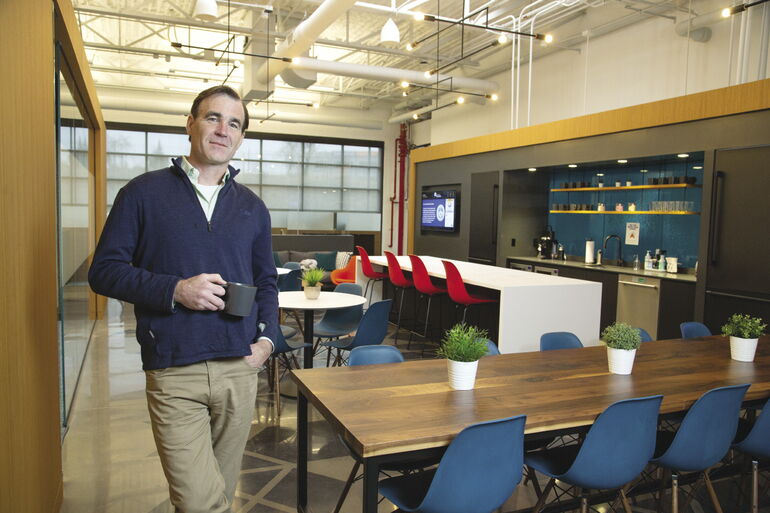Processing Your Payment
Please do not leave this page until complete. This can take a few moments.
-
News
-
Editions
-
- Lists
-
Viewpoints
-
HBJ Events
-
Event Info
- 2024 Economic Outlook Webinar Presented by: NBT Bank
- Best Places to Work in Connecticut 2024
- Top 25 Women In Business Awards 2024
- Connecticut's Family Business Awards 2024
- What's Your Story? A Small Business Giveaway 2024 Presented By: Torrington Savings Bank
- 40 Under Forty Awards 2024
- C-Suite and Lifetime Achievement Awards 2024
- Connecticut's Health Care Heroes Awards 2024
-
-
Business Calendar
-
Custom Content
- News
-
Editions
View Digital Editions
Biweekly Issues
- April 15, 2024
- April 1, 2024
- March 18, 2024
- March 4, 2024
- February 19, 2024
- February 5, 2024
- January 22, 2024
- January 8, 2024
- Dec. 11, 2023
- + More
Special Editions
- Lists
- Viewpoints
-
HBJ Events
Event Info
- View all Events
- 2024 Economic Outlook Webinar Presented by: NBT Bank
- Best Places to Work in Connecticut 2024
- Top 25 Women In Business Awards 2024
- Connecticut's Family Business Awards 2024
- What's Your Story? A Small Business Giveaway 2024 Presented By: Torrington Savings Bank
- 40 Under Forty Awards 2024
- C-Suite and Lifetime Achievement Awards 2024
- Connecticut's Health Care Heroes Awards 2024
Award Honorees
- Business Calendar
- Custom Content
Following Elm City move, CT Innovations eyes ambitious five-year plan to invest $200M in startups
 PHOTO | Steve Laschever
Connecticut Innovations CEO Matt McCooe stands inside the quasi-public venture capital firm’s new New Haven office, which puts it closer to the city’s bustling bioscience community.
PHOTO | Steve Laschever
Connecticut Innovations CEO Matt McCooe stands inside the quasi-public venture capital firm’s new New Haven office, which puts it closer to the city’s bustling bioscience community.
When Silicon Valley investors or out-of-state entrepreneurs would visit Connecticut Innovations at its old Rocky Hill location, they’d pull up to an uninspiring building in a generic suburban office park down a road off I-91.
For a state that has been working to shake an image problem and sell itself as an up-and-coming innovation hub to venture capitalists and companies looking to move here, it didn’t exactly make for an exciting or helpful first impression.
It also did little to showcase the strengths of the state’s urban centers, which are viewed as the key to the state’s economic future and where Connecticut has been investing most of its energy and economic development dollars in recent years.
“Nothing against Rocky Hill, but [the building] was the definition of nondescript,” Michael Cantor, board chair for the state’s quasi-public venture capital arm, said of the old headquarters. “Many of these entrepreneurs [who visited] were already working in pretty vibrant, pretty cool cities. To come to this suburban office park — we were already starting off in a bad place.”
So when CI’s lease expired in 2019, the organization made a strategic decision to move its headquarters to a denser urban environment. It ultimately chose the Elm City, placing it at the state’s startup and bioscience epicenter, and closer to where the majority of CI’s portfolio companies are located. That central location will be even more important in the years ahead as CI plots an ambitious strategy to invest $200 million in Connecticut startups over the next half-decade.
Just as the pandemic hit, CI moved its operations into a 10,000-square-foot space inside the District, the Silicon Valley-style innovation campus that opened in a refurbished bus garage at 470 James St. CI also opened a smaller office in Hartford’s Colt building and is planning a third in Stamford.
The pandemic has kept most of the team working from home for now, but CI hopes to occupy the New Haven office and hold a socially distant grand opening by the end of the summer.
“We want to be closer to our companies. That’s the theme here,” said CI’s CEO Matt McCooe. “We’ve got a ton of really fantastic life sciences companies in New Haven, a very close relationship with Yale University, and I think New Haven is an awesome, underappreciated small city.”
“For me, personally, it’s just cool and fun and I love being here,” he added.
Pay-it-forward model
In a state where venture capital funding has always been a challenge, CI has played a big role in funding startups and early-stage companies in industries seen as key to the state’s future economic growth, such as bioscience, fintech, insurtech and advanced manufacturing.
It has been a major driver of the economy in the New Haven region especially, with its plethora of biotechnology startups, including successful companies like Biohaven and Arvinas, both of which have gone public and are growing.
In 2019, Forbes singled out CI as one of the top 10 investors in healthcare startups, and it is regularly ranked by Crain’s as one of the most active firms on the East Coast.
“It’s a unique institution in that it is both a very sophisticated player in terms of venture capital, but it's got a public policy role in trying to continually help the innovation economy keep growing in the state,” said Matthew Nemerson, New Haven’s former economic development administrator who now works for Shelton-based energy startup Budderfly, a CI portfolio company.
“The great thing about CI is that they have a whole staff that’s looking at the world the way the marketplace does: Who’s competitive? Who’s got great ideas? Who can grow?” Nemerson said. “Those are great skills to have in a complex system like government.”
CI adopts what McCooe describes as a pay-it-forward model: it re-invests all of its returns — estimated to be as much as $25 million to $30 million this year — into funding more Connecticut startups.
In a typical year, it evaluates as many as 700 companies but will invest in just 15 to 25. McCooe sometimes jokes that it's easier to get your child into Harvard than to access capital from CI.
“But there’s a reason for that. We don’t have enough follow-on capital for 700 new companies and there aren’t 700 good ideas a year,” he said.
When deciding where to invest, McCooe said CI looks for what he calls the Pied Piper effect: dynamic entrepreneurs with a solid product or idea that “everybody wants to get behind,” from employees to outside investors.
CI is often the first investor for novice entrepreneurs, providing coaching and early capital to companies other investors consider too risky.
SeeClickFix founder Ben Berkowitz said CI was key to convincing skittish investors to participate in his startup’s $1.6 million series A funding deal in 2015.
“Two Silicon Valley investors did contribute most of the funding for that round, but it took CI and [New Haven VC firm] Elm Ventures leading it,” recalled Berkowitz, who sold the successful civic engagement startup in 2019 to government website developer CivicPlus for an undisclosed price.
“At the time there was still skepticism in the valley about flyover states and it was still a little bit hard to get money from VCs. And I think we had it a little tougher because we were in government technology. Now it’s a very appealing sector to be in, but it wasn’t then,” Berkowitz said. “CI was able to look beyond some of the traditional VC tropes that might have prevented us from getting investments.”
Five-year plan
CI’s move to New Haven comes as it embarks on a five-year plan to put Connecticut on the map as a technology and life sciences hub, building on its momentum under McCooe, a former corporate VC and university tech transfer executive who became CEO in 2015.
McCooe said the organization, which now has some 200 portfolio companies, plans to invest an additional $200 million into Connecticut startups in the next five years, boosting the value of its portfolio by $140 million and netting a predicted $50 million in returns for CI.
His ultimate goal is for Connecticut to be mentioned in the same breath as other up-and-coming innovation centers around the country — places like Miami, St. Louis and Austin, Texas — and the move to the District will finally give CI a physical space that matches the mission.
“We’re not trying to become New York City or Boston or Silicon Valley, obviously,” he said. “But we think Connecticut is a great place to be and there are a lot of fabulous companies here.”
He said CI portfolio companies have collectively raised billions of dollars in venture capital the last two years — something that wasn’t happening six or seven years ago. And he said the state has produced a new unicorn — a private company valued at more than $1 billion — every year for the last six years.
Although McCooe gives credit to the entrepreneurs and researchers behind those startups, observers like Nemerson say without CI, it’s likely some of them would have put down roots somewhere other than Connecticut.
“People who put in the most money sometimes can influence where a company is located,” Nemerson said. “And I think that clearly the role that CI plays at the very beginning — in helping people get those first ideas planted in the ground here — is very important. Because you don’t want them wandering off to Seattle or somewhere else.”
Although other quasi-public agencies have come under scrutiny in Connecticut recently, McCooe said he’s never heard any of those types of concerns directed at CI, and he said the organization’s results speak for themselves.
“If we weren’t doing good work and weren’t attracting capital and getting good returns, I think we would have been shut down 15 years ago,” he said. “Whatever your economic or political leanings are, I don’t know anyone who doesn’t want more startups to grow here in Connecticut.”
RELATED: CI’s New Haven digs aim for vibrant urban setting

2022 Giving Guide
This special edition informs and connects businesses with nonprofit organizations that are aligned with what they care about. Each nonprofit profile provides a crisp snapshot of the organization’s mission, goals, area of service, giving and volunteer opportunities and board leadership.
Learn more
Subscribe
Hartford Business Journal provides the top coverage of news, trends, data, politics and personalities of the area’s business community. Get the news and information you need from the award-winning writers at HBJ. Don’t miss out - subscribe today.
Subscribe
2024 Book of Lists
Delivering Vital Marketplace Content and Context to Senior Decision Makers Throughout Greater Hartford and the State ... All Year Long!
Read Here-
2022 Giving Guide
This special edition informs and connects businesses with nonprofit organizations that are aligned with what they care about. Each nonprofit profile provides a crisp snapshot of the organization’s mission, goals, area of service, giving and volunteer opportunities and board leadership.
-
Subscribe
Hartford Business Journal provides the top coverage of news, trends, data, politics and personalities of the area’s business community. Get the news and information you need from the award-winning writers at HBJ. Don’t miss out - subscribe today.
-
2024 Book of Lists
Delivering Vital Marketplace Content and Context to Senior Decision Makers Throughout Greater Hartford and the State ... All Year Long!
ABOUT
ADVERTISE
NEW ENGLAND BUSINESS MEDIA SITES
No articles left
Get access now
In order to use this feature, we need some information from you. You can also login or register for a free account.
By clicking submit you are agreeing to our cookie usage and Privacy Policy
Already have an account? Login
Already have an account? Login
Want to create an account? Register
Get access now
In order to use this feature, we need some information from you. You can also login or register for a free account.
By clicking submit you are agreeing to our cookie usage and Privacy Policy
Already have an account? Login
Already have an account? Login
Want to create an account? Register






0 Comments